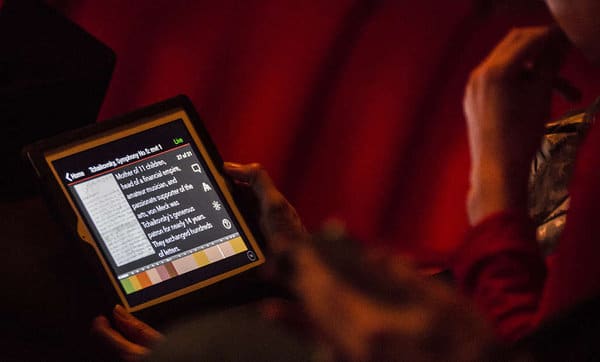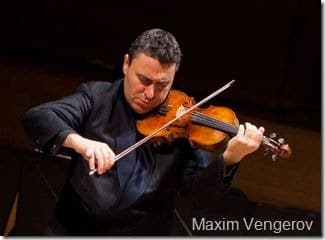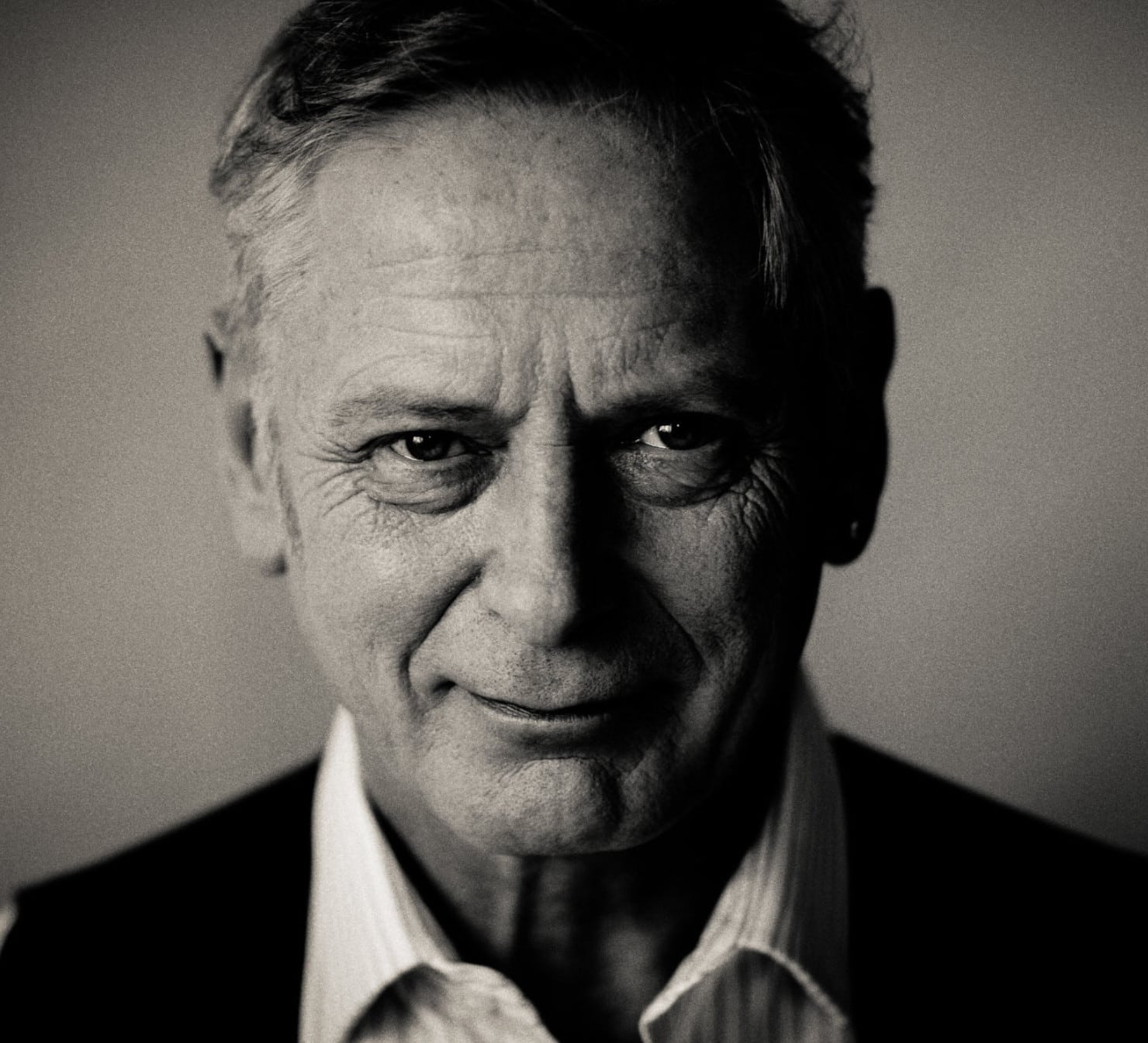Maxim Vengerov: Here’s what happened when I played in the dark
mainThe violinist continues our discussion on gadgets in the concert hall.
Allow me to thank three people who brought this important matter to discussion: my colleague violinist Yevgeny Chepovetsky, wonderful pianist Christian Zacharias and Mr. Norman Lebrecht whose brainchild, Slipped Disc, has become the ‘meeting place’ for the classical music community.
The subject I am about to tackle deserves much attention, but I will try to be short. As an optimist and as one who believes that for every problem there is a solution, I had recently performed a daring experiment, playing a recital in the fully packed, newly refurbished concert hall of the Israel Philharmonic in Tel Aviv. Doesn’t sound too adventurous, does it? Except that for two hours, my pianist and I shared our music with an audience of over 2000 people who sat in the darkness. (There were only twelve small electronic candle lights, a tiny spotlight for my pianist to read music, and the emergency lights we were obliged to keep.) Yes, my decision was to go to the absolute extreme — to free music of any distractions — so She, carried by the magnificent acoustics of the Philharmonic hall to the very last rows of the balcony, could penetrate and reflect the hearts and minds of my audience through their enhanced auditory senses. That was the concept of this experiment — to keep music pure, undiluted by the visuals, and make Her the sole focus for the listeners.
The repertoire choice was quite unusual, as well. In the first half of the programme, I performed the Second Partita by Bach for Violin Solo, followed by the famous Franck Sonata. After a short intermission, we repeated exactly the same programme. [A brief explanation as to why I had chosen the Franck sonata: When famous Belgian violinist Eugene Isaye (to whom Franck dedicated this sonata) premiered this piece, the electricity went out during the first movement. Isaye and his pianist decided to carry on with the performance, playing by heart in total darkness. “Magic…” “Hypnotic…” — critics and listeners described the performance. I think there’s a good reason why some artists, including Svyatoslav Richter, preferred to play concerts with very little or no lights at all.]
Back to my own experiment– after approximately 15 minutes of “adaptation” – the noise of coughing, sneezing, and moving in their seats — the “dust settled,” and people became absorbed in the music. There was nothing to distract them from the main reason why they were there that evening. Interesting observation: The audience’s level of concentration was higher during the second half of the programme. Why? Perhaps the material now seemed more familiar. More engaging.
For me personally, it was the greatest experience of my life! Judging from the recording that was made from the concert, there appears to be two different artists playing before and after the intermission. I can tell you with confidence that ‘an artist’ playing Bach’s Partita and Franck’s Sonata during that particular second part of the recital is The Artist I have always strived to be. Never before had I felt that level of concentration. As though taken to a different world, where infinity was compressed into a single moment of beauty, I became a listener – like everyone else in the concert hall – rather than a performer. My only worry was: “What if I am the only one here who is having an awesome experience? What if my audience feels nothing other than confusion about being in a dark concert hall?”
Afterwards, the audience members’ responses relieved me of my worry. They were diverse. Some told me that the atmosphere of the concert was electrifying; others found the experience soothing and meditative. There were a few listeners who admitted that during the recital their minds were wandering through ups and downs, making them uncomfortable, even desperate, exposing deep-seated feelings of remorse that resulted in tears. But the majority saw the concert as “a therapeutical, hypnotic experience” that allowed them to get in touch with their souls.” They thanked me and asked me to repeat the same “concert in the dark” again. That was the ultimate goal of my experiment — to show that the concert should not be about artists, not even about Music! Music is a conduit that channels and reflects the human range of emotions, tuning, balancing, and healing our souls.

Over the last century, the scientists have conducted numerous researches into ‘music therapy,’ trying to determine how music can influence our physical and mental being. Unfortunately, none of them have been conclusive and consistent, and just a few have been implemented. After staging my own experiment, I can state with assurance that the appropriate selection of music played at the right venue with the fitting atmosphere, can create an enormous impact on the listeners.
That is why we should advocate and promote the awareness of the importance of Music, whether it is classical, ethnic, or popular Music. For as long as Music carries a pure message and charges its audience with positive energy, we musicians will fulfill the purpose of concertgoers and may foresee the revival of the recording industry. Otherwise, we will soon become homeless musicians — “beggars” who are trying to sell something we believe in, while losing our believers.
Then there are our concerns about the YouTube’s music video clutter, Facebook glasses’ augmented reality, the brain chips turning us into potential super humans, and the terrible habit of multitasking during concerts. These worries become irrelevant for the reasons I will detail below.
I feel there is a need to distinguish between a classical music concert, a crossover show, and a recital that is aimed at nurturing peoples’ souls. Unfortunately, today everything seems to be mixed together. Let’s take YouTube, for example. Music, without being classified, can be found through the search system. In fact, we can find just about anything, under the condition, of course, that we know what we are looking for. The future of music lies in the hands of the younger generations that know how to search the Internet, but often know little about what they are trying to find. As a result, the abundance of the information at their fingertips often becomes misleading. A young person, seeking to hear and to learn about a Beethoven Symphony, for instance, ends up watching the footage that had received the highest number of clicks. Yes, that’s the indication of the quality today — the number of views and tweets, and interminable forums that give equal space to anyone who wishes to express his or her opinion — often, anonymously. Do not get me wrong, open discussions are vital, but they must be open. We should know the identities, as well as the levels of expertise, of those whose musical judgments serve as guidance for the young and inexperienced music lovers.
There is another problem. Almost all music on the Internet has been uploaded in a compressed file format, turning great performances into good ones. Why shouldn’t YouTube have created a special niche for classical musicians so they could upload their recordings in top sound quality rather than in compressed versions and classify them similar to the way music stores had done it in the past? Then the audience could differentiate between a great sound quality product (which costs, by the way, a few hundred thousand dollars to produce in a professional recording studio) and a good one (accessible easily and free of charge on the Internet).
Again, the Internet is a terrific tool to work with, but it can also be aggressive in dominating our lives, feeding our weaknesses, promoting the values that are vastly different from our own.
The choice is ours. But we should never underestimate the importance of a high-end quality studio recording. This is the most ideal sound presentation that a musician can deliver — technically and emotionally, while maintaining the aura of a live performance. This level of sound recording can rarely be achieved during a concert (we all know that the audience is never silent). Yes, there are technologies that can erase any noise, but along with muting the noise we also “wash away” some of the precious overtones that the recorded music allows us to hear up close. A studio recording preserves a more detailed, more intense performance, as the microphones are less forgiving than a human ear.
I was ten years old when I did my first studio recording with the Russian Melodia label. And since then, I use a recording studio in order to push myself to the absolute limits and get the best musical result. Through that experience, when I come on stage, I try to bring the same level of perfection and musical density during a live performance.
I must admit that listening to a studio recording is more challenging than watching a concert. The audial experience requires a higher level of concentration and patience that the visual. But we must learn to listen to music with our ears and not with our eyes.
I remember listening (with my eyes closed) to some of my early video recordings and not being very pleased with them. Then I watched (and listened to) the same videos, and, surprisingly, felt more forgiving. There is only one conclusion here. The next time we go to a concert hall to hear music, we should simply close our eyes to enhance the auditory experience. After all, that’s what music is about, isn’t it? As Dmitri Shostakovich said: “There is music that deserves undivided attention.”
Yes, I think if people go to a concert they should benefit from it with maximum effect. For example, we wouldn’t be multitasking while receiving a massage, would we? Probably not. Instead, we would try to relax and enjoy the experience, concentrating on our body and mind. Why not to do the same during those two precious hours of a classical music concert? To withdraw from our daily routine and worries, to reflect on our inner being, to connect with the forces of the universe that make us human.
As we all know, anything in life can take us a step forward while threatening to destroy us. But, as Nietzsche said, “What doesn’t kill you makes you stronger.”
The media, the Internet, the latest gadgets… Will these modern vehicles of the technological evolution destroy us while taking us to the next level of civilization?
As I declared in the beginning, I am an optimist. And I am a huge believer in Music’s untapped potential. She will forever provide us with that sacred place where we can be in harmony with ourselves and with the universe. All we need to do is allow Music into our hearts. And She will reward us generously.
Yours Maxim Vengerov






Beautiful sentiments, beautifully written. Thank you.
On a less exalted, more “Slipped Disc” level, two advantages of a concert in the dark come to mind:
(1) It doesn’t matter what the performers are wearing; and
(2) Everyone can tell if you’re looking at your phone.
😛
When at home I often listen to recordings in darkness as this really focuses concentration on the music. I had not thought it would ever be possible in a ‘live’ concert.
No matter its value to those seeking an introduction to a work or casually finding a hitherto unknown one the listener finds enjoyable, I agree so much with the comments about YouTube. Now it seems bent on destroying the classical music listening experience by inserting advertisements in between movements in many videos of full length performances!.
Maxim, this is a wonderful post and I love everything you shared. You know, in teaching, I always ask my students to imagine the time period when much of the music they are playing was composed. Think about the instruments of the time, the technology–and not having the technology–shut the light off in the studio and allow the daylight to permeate the environment. Shut out outside noise, and imagine the world from when the music was conceived and heard. Playing in the dark does indeed turn away the modern world and all of its components and sounds. Personally, I used to enjoy the dark practice times more than anything. I hope to witness one of your performances in this fashion.
Not to turn a dark subject dismal, but Bruckner symphonies were performed in Nazi Germany in total darkness — to great success, apparently — as part of the party’s appropriation of the composer as an ideal people’s composer, even more than Wagner. The fascinating, if sordid, details are in Cambridge UP’s Bruckner Studies.
That is fascinating, reading about it now. Thanks!
That concert sounds amazing! Will this recording be released at some point? Who was the pianist?
The pianist was Shira Shaked
I was fortunate to have attended the concert, but for those who weren’t there, please release it.
A wonderful post, thank you Maxim! Please try to continue your successful experiment! Bring it to London! I’ve been fortunate enough to have been to some concerts with artists like Anderszewski who have persuaded the concert hall management to turn down or off most of the lights and who have repeated substantial parts of their programme, usually as encores. No apology was necessary for this – my impression was that the audience absolutely loved both aspects. And turning down the lights stops all the irritating fiddling with programmes! Why go to a concert to read rather than listen? I’m really glad that you have found the format for yourself and your audience so rewarding.
And thank you too for your thoughtful comments about recorded music and the internet. The latter is a great resource for study and exploration, but as you so eloquently expressed: there are pitfalls!
Beautiful article. Completely agree. In the early 1990s I used to prom at the top of the Gallery, at the Royal Albert Hall, for the BBC Proms concerts. I used to take a blanket and lie on the floor with my eyes closed. I was completely concentrated and calm for the whole concert each time I did this – no distractions, just 100% focus on the music. The musicians couldn’t see me and I couldn’t see them, but the experience was wonderful. It’s also the coolest place in that Hall on a hot summer day!
Graham Southern
Chief Operating Officer
Presto Classical